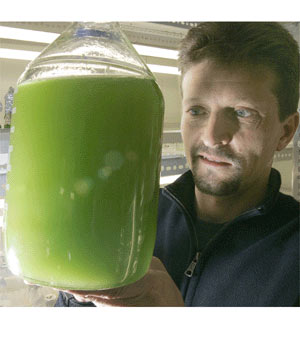Scientist Mike Packer is wild about pond scum.
"They are green, beautiful, do lots of cool things and nobody cares so much if you kill them," he said from his laboratory at the Cawthron Institute in Nelson.
"These are single-cell plants that are really quite neat."
Dr Packer, a biochemist and cell-biologist, said the algae had a lot of promise for use in the area of biofuels. Depending on the species, a lot of the algal biomass was in the form of fats or oils that could be converted to biodiesel and other biofuels.
Dr Packer is speaking at Nelson Marlborough Institute of Technology at 7.30 tonight on algae, biofuels and other future technologies.
He said it was thought algae might be 30 times more efficient at producing oils than land-based plants such as rape seed, canola and corn.
But this was not the only reason he was so passionate about them. Some micro-algae produced hydrogen gas as a byproduct when deprived of oxygen.
"It's causing a lot of interest, although it's quite tricky to do on a larger scale."
Dr Packer said he was particularly interested in the enzyme called hyrdogenase involved when the algae produced hydrogen. It was essentially a biological equivalent of the expensive and rare metal platinum.
The planet did not have enough platinum to support a hydrogen economy using present technology, he said.
So in addition to producing hydrogen directly from living micro-algae, the enzyme might be a cheap renewable replacement for platinum in fuel cell devices.
But he warned that there was no "magic bullet", and while algal energy had great potential, it would not meet all the planet's energy needs.

